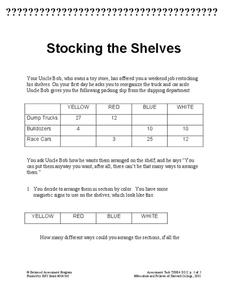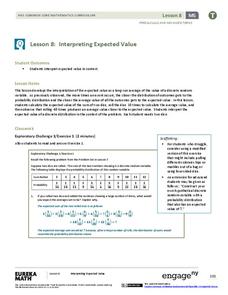National External Diploma Program Council
Finding an Average
Young hopefuls can practice finding the average of a group of numbers represented in tables and word problems.
Museum of the Moving Image
AdMaker, Nixon vs. Humphrey, “Convention” (1968)
After viewing the infamous 1968 Presidential campaign ad, "Convention," groups use AdMaker to create their own 30 second ad that features Richard Nixon rather than Hubert Humphrey.
EngageNY
End-of-Module Assessment Task: Grade 8 Mathematics (Module 7)
It's time to discover what your classes have learned! The final lesson in the 25-part module is an assessment that covers the Pythagorean Theorem. Application of the theorem includes distance between points, the volume of...
Concord Consortium
Stocking the Shelves
How many ways can you stock a shelf? It's probably more than you think! Young scholars use data in a frequency table to determine how many ways to stock a shelf given a specific constraint for types of groups. They then repeat the task...
Curated OER
Addition Grid
Which of these numbers add up to 20? Scholars find various addend pairs in a grid, circling those that add up to 20. There are many pairs they can find here, and the answer sheet offers some excellent kinesthetic practice ideas for...
West Contra Costa Unified School District
Introduction to Inverse Functions
Ready to share the beauty of the inverse function with your classes? This algebra II lesson guides the discovery of an inverse function through a numerical, graphical, and an algebraic approach. Connections are made between the three,...
Teach Engineering
Using Hooke's Law to Understand Materials
Provide a Hooke for a lesson on elasticity with an activity that has groups investigate a set of springs. They use a set procedure to collect data to calculate the spring constant for each spring using Hooke's Law. The groups...
EngageNY
Interpreting Expected Value
Investigate expected value as a long-run average. The eighth installment of a 21-part module has scholars rolling pairs of dice to determine the average sum. They find aggregate data by working in groups and interpret expected value as...
Teach Engineering
Engineers Love Pizza, Too!
Help overcome challenges in eating pizza. Scholars work in groups to design a device that assists a physically handicapped person eat pizza. They build a prototype of such a device to test their designs before building. To...
Chicago Botanic Garden
Are All Plants Created Equal?
Photosynthesis requires energy and produces food, and cellular respiration produces energy and requires food. An interesting lesson analyzes the factors that affect the rates of photosynthesis and respiration. Classes spend one day...
Washoe County School District
Eyewitness to the Holocaust
Scholars investigate the Holocaust through the eyes of an Auschwitz survivor. They analyze and research a firsthand account of events inside the gas chambers moments before hundreds died. Using Holocaust Reading Passages and...
US House of Representatives
Traditionalist, Feminist, and the New Face of Women in Congress, 1955–1976
As part of a study of women in Congress, class members read the contextual essay, "A Changing of the Guard; Traditionalist, Feminist, and the New Face of Women in Congress, 1955–1976." Groups then research a woman serving during this...
American Museum of Natural History
What Do You Know About PaleontOLogy?
Believe it or not, some dinosaurs are not extinct. Discover this and other interesting facts about dinosaurs in a 10-question online quiz. As individuals answer questions, the resource provides them with feedback and additional facts...
American Museum of Natural History
What Do You Know About Horses?
A 10-question online quiz tests scholars' knowledge about horses: all answers come with an informative explanation.
Curated OER
Tunes for Bears to Dance to: Vocabulary Strategy
To prepare for a reading of Robert Cormier's Tunes for Bears to Dance to, kids research vocabulary drawn from the novel and share their findings with their groups.
Virginia Department of Education
Exponents and Radicals
What is that fraction doing as an exponent? Fun math games prompt learners to practice evaluating radical expressions and expressions containing rational exponents, both in groups and individually.
Teach Engineering
Design and Build a Rube Goldberg
Let's see how complicated we can make this simple task. The last activity associated with a 10-part series has groups design and build a Rube Goldberg machine. Teams determine a simple task to accomplish and use the engineering design...
Teach Engineering
Designing a Robotic Surgical Device
The engineering design process meets laparoscopic surgical robots with an activity that is the last part in a series of 10 and brings all the lessons of the unit together. Teams design and build a remotely controlled laparoscopic device....
University of Colorado
Astro-Chronology
Class members play a version of the game Chronology to determine when certain scientific events occurred in history. Teams play until someone has 5-10 events in the correct order.
Virginia Department of Education
Distance and Midpoint Formulas
Small groups work through two guided activities to derive the distance and midpoint formulas for the coordinate plane. The activities begin with concrete examples and move to abstract.
EngageNY
Comparing Estimated Probabilities to Probabilities Predicted by a Model
Small groups devise a plan to find the bag that contains the larger percentage of blue chips. they then institute their plans and compare results to the actual quantities in the bags.
EngageNY
Why Worry About Sampling Variability?
Are the means the same or not? Groups create samples from a bag of numbers and calculate the sample means. Using the sample means as an estimate for the population mean, scholars try to determine whether the difference is real or not.
Blake Education
Harry Potter and the Philosopher’s Stone
The motto for Hogwarts School of Witchcraft and Wizardry warns that one should never tickle a sleeping dragon, but learners will definitely be tickled by the activities in a packet of materials designed to accompany a reading of the...
Illinois Mathematics and Science Academy
A Search for Symbolism in The Great Gatsby
After reading The Great Gatsby, groups return to the text and note passages where Fitzgerald uses symbols and color imagery in his narrative. They then develop a presentation that explains the context, the implications, and possible...

























